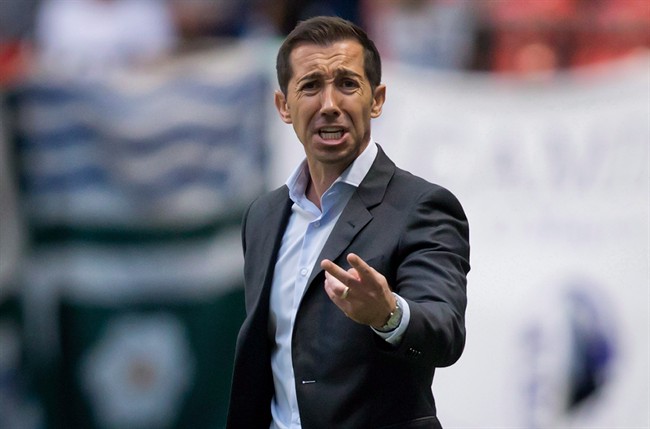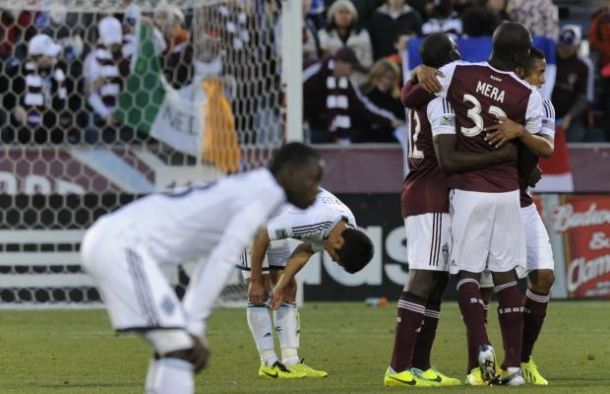The Vancouver Whitecaps finished up their third Major League Soccer season on Sunday against the Colorado Rapids. They won 3-0 thanks to a hat-trick from Camilo. With that performance, the Brazilian finished as the Golden Boot winner with 22 goals, surpassing the Chicago Fire's Mike Magee and the Montreal Impact's Marco Di Vaio.
Along with that individual accolade, the Whitecaps also claimed their fourth Cascadia Cup by picking up nine points against their rivals Portland and Seattle. The Caps also earned more wins (13) and points (48) this year as opposed to 2012. Yet The Blue and White finished in seventh place in the Western Conference after yet another late season collapse.

This is nothing new with Martin Rennie. It's occured the last four years, which has media and fans calling for the Scotsman to be sacked in the offseason. It's one of the many questions that will be asked this winter.
On July 14th, the Whitecaps were coming off of a 3-1 victory at BC Place over the Fire. Vancouver was third place with 32 points and a 9-5-5 record, they were even in discussion for the Supporters Shield. After that day, the Caps lost seven games to finish 4-4-7 in their remaining fixtures.
There were several reasons why this transpired for a second consecutive campaign. Injuries, suspensions, and players being called up for international duty definitely played a role. Kenny Miller, Russell Teibert, Darren Mattocks, Jay DeMerit, and Gershon Koffie were just a few of those who were affected. That led to Rennie needing to change his tactics in his 4-3-3 system.

However, one of the biggest reasons that affected the Whitecaps push for the playoffs was the rotation system that the coach had. Even with most or all of his squad available, the Scot made some questionable decisions. Tommy Heinemann starting against the Montreal Impact was one. The manager himself admits that the former NASL forward isn't good with the ball at his feet.
That's a problem. He might be able to get away with finishing off of headers in North America's second division, but not in MLS. He was facing two commanding defenders in Alessandro Nesta and Matteo Ferrari, but it's counterintuitive to select a player who's only effective through one scenario: crosses.
Camilo later came on as a substitute and scored a brace, but he eventually would've scored as both Italians are older, and would've felt the fatigue later on regardless. Plus the Brazilian is a shifty striker, so even if it was early in the game, Nesta and Ferrari wouldn't have been able to keep up.
Starting Johnny Leveron as a holding midfielder in a crucial game against Dallas was another head scratcher. He hadn't started a single match in that role, yet in a crucial Western Conference battle, Rennie selected the Honduran in a position he's not too familiar with.
Daigo Kobayashi's situation was also a heavily discussed topic in Vancouver. He began the season in his favoured number 10 role, but up until that match in Dallas, he was playing a deeper role. The Japanese playmaker doesn't track back and his creativity gets limited. When starting in behind the strikers near the end of the season in a diamond midfield, he thrived.
It's strange that Rennie continued to use the same system as well when teams clearly figured it out. Tinkering the lineup here and there isn't bad, like switching a midfielder for another or slotting in a youngster. The chemistry doesn't get affected, and a new element is added that the opposition isn't used to.
The chopping and changing was common in away fixtures. Rennie treats games away from BC Place like it's mysterious voodoo that cannot be interfered with. While it's true that road matches are significantly more difficult than in any other league (travel distance, time zones, etc.), it's not so complicated if the coach makes the right calls.
The Whitecaps were 4-4-9, which is tied for the third best record in the West. Yet two of those wins came at the end of the year when Rennie switched to the diamond midfield, the last win before that came in a lackluster 1-0 win over the worst team in the league, DC United. The win over the New York Red Bulls was the first away victory of the campaign.
The last seven games, bar the Real Salt Lake loss at home, have shown signs of optimism in that department, meaning Rennie could very well turn a corner in that respect. He simply needs to take a few more risks. Salt Lake did it with a shorthanded squad in Vancouver and won, hence why they were the best road team in the West. Up until their late collapse, the Seattle Sounders did the same.
Kekuta Manneh was one of the players that nearly secured the Whitecaps with a playoff spot. His hat-trick in Seattle was nothing short of spectacular, but he always had it in him, hence why he was selected fourth overall in the 2013 SuperDraft. Despite that, the coaching staff were hesistant to give him more minutes until the summer.
In his defense, he's 18 years old, but New England Revolution starlet Diego Fagundez is six weeks younger, yet he started 28 games, scoring 13 goals while recording seven assists. He was an integral part of the Revolution, yet he's still a teenager. Manneh, on the other hand, had 20 appearances compared to Fagundez's 31, but made the XI just six times.
Other youngsters like Deshorn Brown, Dillon Powers and DeAndre Yedlin got significant minutes. They also contributed plenty for their teams.
Rennie possesses fantastic young players like Manneh, Teibert, Mattocks, Koffie, Erik Hurtado, Omar Salgado, and Sam Adekugbe. Some are further along in their development, but giving half of those names a vital role wouldn't be the worst idea. Colorado has three, it worked out well for them in 2013.
The squad doesn't need any revamping, which is encouraging for Whitecaps supporters, but Rennie must show tactical flexibility, give youngsters a chance to shine, and cannot be cautious in every single game. If he does, his job could be safe for a while, assuming he isn't sacked in the near future.










































